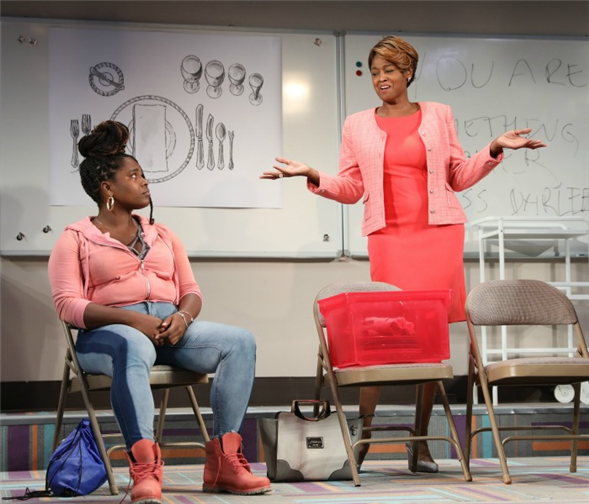Translate Page

MCC Theater's new drama focuses on a one-of-a-kind charm school
---
Northlight Theatre's artistic director, BJ Jones, was so taken with a 2012 Chicago Tribune story about Gloria Allen, an African-American, sexagenarian transwoman teaching an etiquette class for LGBTQ youth, he asked his friend, playwright Philip Dawkins, to pen a show about it. But Dawkins was initially skeptical. "I agreed that it would make a great play, but it wasn't for me," he recalls. Though Dawkins had tackled gay themes in his work, he felt this was "too far from my voice -- and there were other people closer to that community."
Eventually, Jones convinced the dramatist to meet with "Mama Gloria" as her students called her, and Dawkins was quickly sold on the project. The sound of her voice, "so much like my grandmother, a similar lilt and a similar giggle," established an immediate connection. And Allen assured him that, even though Dawkins was a white, cisgender, thirtysomething gay man, all he had to do to capture her voice was, "Make me sound fabulous." Once Allen's pupils gave the okay, he officially signed on. "I wanted to write about her because I fell in love with her," Dawkins says. "And then I fell in love with the participants."
For Northlight Theatre's world premiere of the play, a man was cast as the Allen-inspired character, Mama Darleena Andrews. But the current MCC Theater production of Charm stars Sandra Caldwell, a veteran actress who recently revealed she is transgender, and is directed by Will Davis, who also identifies as trans. Their participation -- along with other trans cast members -- certainly ups the piece's authenticity.
And that's always been important to Dawkins. In fact, in order to accurately capture Allen and her acolytes, the dramatist attended her classes every week for six months; while Charm is fictionalized, its stories and characters are based on what he experienced. Dawkins has fashioned the narrative as a classic inspirational teacher story, though it eschews some of that genre's tropes. "It veers away from the traditional -- it's structurally chaotic," he says. "It's not a plot-y show; it's character-y. It's not a play that's like, Oh my god, look at the script! It's, Oh my god, look at these humans, these characters, this community."
{Image1}
Dawkins is especially interested in the intergenerational conversations at the core of Charm. As a gay youth in conservative Phoenix, Arizona, he found understanding on community theatre stages working with older artists. "I was frequently the youngest person in the room," he recalls. "I don't understand why in our culture we split off into age groups. All of those adults in my life understood the situation that I was growing up in, which was very intolerant and evangelical. And they could all see this queer little magic unicorn fairy that I was."
Although Charm touches on some very dark subjects, including homophobia, racism, and violence, Dawkins injects humor throughout since Allen's real-life students used it as a coping mechanism. "That's what I really liked about the charm class," Dawkins says. "People would be sharing with their group about their rape, and then crack a joke and everyone would laugh. Laughter during a confession or vulnerable moment tells you people are listening. I thought, this is a room I get. These people are experiencing massive trauma but are not afraid to laugh at their lives or each other."
The charm class members were also not afraid to speak up when Emily Post-style binary gender rules didn't meet the needs of our more fluid age, a subject that's dealt with in the play in a particularly animated scene. But other aspects of the manners mistress' philosophy still hold true. "If the rules that you're following that I have outlined in this book do not make your guests feel comfortable, then change the rules," Dawkins says, paraphrasing Post. "Don't change the person to conform to the rules. The rules are there to serve the person, not the other way around." Sounds like a winning life philosophy, regardless of how one identifies.
---
TDF MEMBERS: TDF MEMBERS: At press time, discount tickets were available for Charm. Go here to browse our current offers.
Follow Martha Wade Steketee at @MSteketee. Follow TDF at @TDFNYC.
Top image: Lauren F. Walker and Sandra Caldwell in Charm. Photos by Joan Marcus.